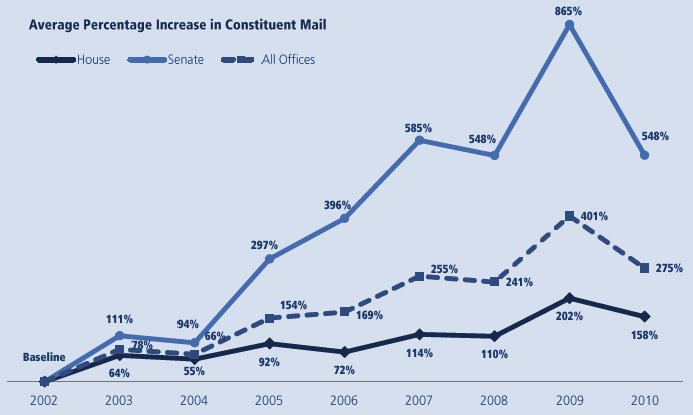 Let’s face it, the world is no picnic these days. We’re facing climate change. The world’s oceans are on the verge of being irreparably damaged. One of the worst humanitarian crises continues to escalate in the Horn of Africa, where famine, war and drought are threatening 13M+ people. Thankfully, we have some incredible nonprofits on the ground who continue to tackle these issues everyday, raise awareness and mobilize people into action. And now more than ever, people are reaching out to their members of congress through online channels to voice their concerns about some of these very issues. But how is Congress responding? Are they adopting new methods fast enough to respond to their constituents in the digital age? Is the fear that their responses could be modified with malintent valid? The Congressional Management Foundation new study, Communicating with Congress: How Citizen Advocacy Is Changing Mail Operations on Capitol Hill provides some good insight.
Let’s face it, the world is no picnic these days. We’re facing climate change. The world’s oceans are on the verge of being irreparably damaged. One of the worst humanitarian crises continues to escalate in the Horn of Africa, where famine, war and drought are threatening 13M+ people. Thankfully, we have some incredible nonprofits on the ground who continue to tackle these issues everyday, raise awareness and mobilize people into action. And now more than ever, people are reaching out to their members of congress through online channels to voice their concerns about some of these very issues. But how is Congress responding? Are they adopting new methods fast enough to respond to their constituents in the digital age? Is the fear that their responses could be modified with malintent valid? The Congressional Management Foundation new study, Communicating with Congress: How Citizen Advocacy Is Changing Mail Operations on Capitol Hill provides some good insight.
According to the study "some congressional offices have experienced a 1,000% increase in communications  volume in the past decade, and [that] Congress has not increased staff size in personal offices since 1979." With those paradigm changes in mind, it makes sense that the constituent communications volume would drastically increase, and that it has been difficult for Congress to keep up. CMF's survey research validated that it is a high priority for congressional offices to respond to constituent communications; though Senate staffers were slightly more inclined to prioritize this particular communication.
volume in the past decade, and [that] Congress has not increased staff size in personal offices since 1979." With those paradigm changes in mind, it makes sense that the constituent communications volume would drastically increase, and that it has been difficult for Congress to keep up. CMF's survey research validated that it is a high priority for congressional offices to respond to constituent communications; though Senate staffers were slightly more inclined to prioritize this particular communication.
The good news is that offices are improving their use of technology by responding to constituent emails versus mailing printed letters, a much more efficient method. The Senate Communications Director confirms this, explaining that "constituents...appreciate the immediacy, the timeliness."
What’s the biggest challenge in being more time efficient on the Hill, now that email is a valid mode of response?
- The review and approval process (mail staffers, 41%, identified this as the largest problem).
- The large amount of incoming mail (senior managers, 35%, believed this to be the biggest issue).
- The attempt to respond substantively each time--the answers differed between mail staffers and senior managers.
CMF also categorized congressional offices based on their attitudes and practices related to social media, and considered the office's reluctance to integrating technology into daily operations. The offices were classified into three categories:
- Early adopters - 34% of staffers identified their office as early adopters vs. 12% responded as late adopters
- Mainstream users
- Later adopters of technology - 50% of late adopters did not believe that they had adequate resources to manage their constituent communications, and late adopters felt more overwhelmed than mainstream and early adopters
Interestingly enough, the majority of CMF survey respondents were 30 years old, or younger--though this held true for the House of Representatives more so than the Senate. Another factor that is called into question here is that this survey was distributed via email, and that may bias the study from those late adopters of technology who possibly would not have responded in a timely enough manner, if at all. It is also notable that more Members of the House of Representatives responded to the survey than Members the Senate did, despite that survey results indicated that 89% of House staff said that responding to constituent communications is a high priority in their offices, versus a greater number, 95%, of Senate staffers. Overall, it is comforting to know that congressional offices are replying to emails with emails. No one wants to be ignored, and everyone deserves to have their voices heard.



COMMENTS